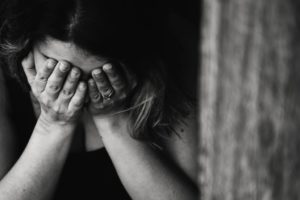The changes that motherhood brings to our minds and bodies are intense. The hormone fluctuations, sleep deprivation, and physical stress can bring on a whole new and unanticipated set of problems. All of these things are out of our control and can cause havoc on even the healthiest of women. When working to “get back in shape” after pregnancy, everyone seems to pay attention to what they eat and getting exercise. Our biggest mistake? Our society fails to emphasize the importance of checking up on a mother’s mental health as well.
 There still lingers a stigma surrounding mental health and discussing it openly. Whether it’s feeling shame about asking for help or feeling that people will treat you differently if they know you are getting help, we continue to shy away from the topic. Let us start off by saying as loud as we can – there is NO SHAME in getting healthy! I use the word healthy because that is exactly what it is.
There still lingers a stigma surrounding mental health and discussing it openly. Whether it’s feeling shame about asking for help or feeling that people will treat you differently if they know you are getting help, we continue to shy away from the topic. Let us start off by saying as loud as we can – there is NO SHAME in getting healthy! I use the word healthy because that is exactly what it is.
Your mental health is equally – if not more – important than your physical health.
It can be very difficult to recognize that you might not be feeling your best self. Sometimes its sneaks up on you month after month. You just get used to not feeling great. Other times, it can hit you like a freight train. Depression and anxiety are very real and life changing. The symptoms can be debilitating, but they can also be so mild that you brush them off as unimportant. No matter the level, these changes can negatively affect your life –and the lives of the people that you love.
Postpartum depression and anxiety can look so different from one person to the next. It doesn’t have to present as crying on the bathroom floor every day for a month. But it might. Perhaps, instead , you notice that you can barely keep your eyes open –no matter how many cups of coffee you down. Waking up in the morning already feeling exhausted and dragging yourself through your days is not just “normal” new mom life. It could be something more. Feeling unattached to your children, caring for them but not really enjoying them is different. The feeling that you are not enough, that your family might not need you, pulling away from people who care about you? All of these things can be cause for concern.
These mental and physical changes may show up right after the birth of a baby – or they may be delayed. I had my first experience with PPD after a miscarriage. Crazy, right?! I had no idea this was a thing. No one ever told me. So I’m telling you. It is. My second experience was after my second child was born. I didn’t feel bad until she was well over six months old. I brushed off all the bad feelings and emotions again because I didn’t think I could have PPD that far from giving birth. Wrong again!
Sometimes, what happens to our bodies and minds is out of our control.
What can we control? How we fix what happens to us.
Recognizing that something is not right and that getting help is the hardest part. If you don’t feel comfortable telling someone close to you, find a doctor or therapist that you can tell. It can be much harder to admit how you are feeling to a friend than a stranger. Even reading stories from other women can help you recognize things in yourself that you may have been pushing aside. If you can’t bring yourself to say the words out loud, send an email, write a note, or send a text. Get it out and make it real to someone besides yourself. No one is judging you more than yourself.
Stop worrying about what other people might think and focus on getting yourself healthy again!
We need to advocate for ourselves, for our partners, and for others we care about. It is uncomfortable, and it is hard to ask for help. It can be equally difficult to watch someone else struggle alone. Never be afraid to reach out to try to help someone. They might be too far out of touch to realize they are lost. We have family and friends to support us through the good, bad, and ugly times for a reason. You would never stand aside and watch someone drown without trying to help. So don’t let it happen to someone who is standing in front of you either.
The only danger lies in doing nothing at all. Be aware of your mental health and that of others. Ask people how they are doing – and keep checking on them. Be honest with yourself and your loved ones.
I encourage everyone who is pregnant or who has a pregnant loved one or friend to do a little research on both postpartum depression and anxiety. We have to start grabbing the hands of the people around us that need help –even sometimes when they don’t think they want it.
Be the light in someone’s darkness; help them find their way out.















